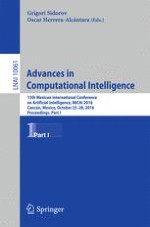
2017 | OriginalPaper | Buchkapitel
Relevance of Named Entities in Authorship Attribution
verfasst von : Germán Ríos-Toledo, Grigori Sidorov, Noé Alejandro Castro-Sánchez, Alondra Nava-Zea, Liliana Chanona-Hernández
Erschienen in: Advances in Computational Intelligence
Aktivieren Sie unsere intelligente Suche, um passende Fachinhalte oder Patente zu finden.
Wählen Sie Textabschnitte aus um mit Künstlicher Intelligenz passenden Patente zu finden. powered by
Markieren Sie Textabschnitte, um KI-gestützt weitere passende Inhalte zu finden. powered by